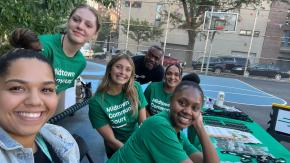
2023 marks the 30th anniversary of our Midtown Community Court, which started as an experiment in a new, more human approach to justice. Today, that approach hasn’t just survived: it has outgrown the walls of the courthouse.
Thirty years ago, on 54th Street in the heart of Manhattan, a new courthouse opened its doors. The first community court in the country, Midtown Community Court embodied a new way of thinking about what a court could do and be. Its mission was as simple as it was unconventional: to treat a criminal case as an opportunity to get people the support they need to live full, productive lives.
In its 30 years of service, Midtown Community Court has opened its doors for people in nearly 500,000 criminal court arraignments and summons appearances, with a successful record of reducing incarceration. Since its launch, dozens of community courts have taken root around the United States, many of which the Center for Justice Innovation helps to plan and operate in New York City and beyond.
Even Midtown’s appearance testified that it was no ordinary criminal court: small enough to be taken in at one glance, its front doors sat humbly at street level. Unlike the large centralized courthouses—each one presiding over an entire borough—it sat right in the neighborhood whose residents it would serve.
Like much of New York City, Midtown Manhattan in the ‘90s faced high crime rates and a soaring jail population. In 1991, there were more than 21,000 people held in NYC jails on an average day, compared to just over 6,000 today. Though an arrest for a low-level offense—like shoplifting or disorderly conduct—rarely triggered a serious sentence, the real punishment could often be found in the process itself, like time spent in jail waiting for a court appearance.
To many, the system looked all too much like a “revolving door,” one that left people no better—if not worse off—than when they came into court. On the one hand, it placed a heavy burden on people charged with minor, non-violent offenses, making it harder for them to pick their lives back up as full members of their communities. Convictions for these low-level offenses can follow a person for life, affecting their immigration status, their ability to secure a job or a home, and even their credit. Meanwhile, many residents saw little change as these conventional responses failed to increase people’s overall sense of safety.
Midtown Community Court—the launch pad for the Center for Justice Innovation—took a different approach. A single judge would greet everyone who came through its doors, promoting an atmosphere of real, human communication. And instead of relying on fines and jail, the program would work alongside the neighborhood to offer people meaningful opportunities for change, from community service to counseling, parenting support, job training, and arts programming.
Putting that idea into practice called for thinking outside the box. Traditional criminal courts weren’t set up to respond to needs for mental health care, jobs, and substance use treatment. So Midtown Community Court did something unique: it partnered with private organizations and non-profit groups in the community to bring those services and more to people who needed them. After leaving the courtroom, a participant could walk upstairs and get access to services in the same building—a new model that reduced barriers to care and showed that there were viable alternatives to conventional sentences like jail.
As the collateral consequences of prosecution have become clearer, arrests have gone down for many of the low-level offenses that once brought people to Midtown’s doors. That shift was the result, in part, of a broad coalition of people working to shrink the harmful footprint of the legal system on people’s lives. For Midtown Community Court, it meant reaching people not just within the system, but going upstream: connecting people to vital services even before they come into court.
That’s one of the tasks of Project Reset, which gives people accused of low-level offenses a way out of the legal system with brief, positive programming without ever stepping foot in court. Through counseling, group support, and even art workshops, participants in Project Reset can avoid the lasting harms of a criminal record while also getting referrals to ongoing services for needs they may have, like employment or education support. Midtown Community Court offers the same kind of fresh start to young people facing weapon possession charges, helping them not just to stay free of legal involvement but also to find a strong network of support to lean on.
We go even further upstream with Community First, a joint effort of our Midtown team and other local organizations—the Times Square Alliance, Fountain House, and Breaking Ground—to bring resources and services to people struggling with housing insecurity and mental health needs on the street. Community navigators with the program go out into the neighborhood with clothing, personal protective equipment, warm meals, and other resources for people who need them. But they also go a step further, building real trust to link people to longer-term services that can be hard to access. Since its launch in 2021, Community First has reached roughly 600 people in the Times Square area.
This initiative happens outside of the courthouse, but it’s an expression of the same idea that Midtown embodied at its inception: harnessing strong partnerships to get people what they need to live healthier, safer lives. Addressing people as full human beings means, among other things, seeing beyond case files and court appearances. To make a more human idea of justice a reality, we have to meet people wherever they are—whether that’s in the court or on the streets.







